Starting an online business from home can be tough without guidance or experience.
I know because I did it. Learning the hard way by trial and error isn’t fun. It takes a grueling amount of work, and a lot of those efforts get trashed because they fail.
It takes a lot of dedication to try something over and over again while constantly failing. Most people will get frustrated after one or two failures and give up forever.
I spent years trying to build my first successful online business without any upfront investment. Once I figured it out, I found it was much easier to repeat the same process to create another new company.
Eventually I realized that each venture that made money had some similarities despite the businesses being drastically different. Two examples: building an eCommerce site vs selling coaching required most of the same strategies to succeed.
You don’t have to spent years wasting time, money and energy to create your first online side hustle.
In this guide, I’m going to teach you a 9-step checklist of tips that will let you skip those years of trial and error when you start your first online business.
Starting an Online Business Checklist
When I’m creating a new business, I will focus on 9 main steps and tips that I have outlined for you below:
- Research business ideas to determine their potential
- Figure out your ideal customer and audience demographics
- Check for business licensing and registration requirements
- Stay on topic with your business content
- Plan how you will monetize your business
- Determine whether to build a website and gain SEO benefits
- Build a customer audience using social media networks
- Use business networking to grow faster and earn more
- Grow a list of email subscribers for easy audience marketing
Some businesses may be able to skip a step or two and still be successful.
However, those companies would simply make more money and grow faster by utilizing all 9 steps.
For this reason, I highly recommend at least reading all of the tips to see how they will relate to the type of business you want to build.
Researching Ideas
Before you can create a business, you need an idea. If you do not already have an idea, think about what you know and what you enjoy.
Here’s a list of general business ideas you can use for inspiration:
- Art
- Auctions
- Advertising
- Amazon Vendor
- Apparel
- Blogs
- Books
- Bookkeeping
- Boutique
- Baking
- Clothing
- Coaching
- Coffee
- Dropship
- Delivery
- Distribution
- Digital
- Diamond
- eBay
- eBooks
- eCommerce
- Etsy
- Golf
- Groceries
- Gardening
- Glasses
- Games
- Hair
- Health
- Influencer
- Jewelry
- Juice
- Lending
- Learning
- Liquidation
- Linen
- Makeup
- Marketing
- Nutrition
- Podcasts
- Reseller
- Raffles
- Scrubs
- Second Hand Store
- Shopify
- Spiritual
- Services
- Stationary
- Training
- Teaching
- Tea
- Tarot
- Vapes
- Videos
- Vintage
- Vitamins
Original Business Ideas
Business ideas can be tricky.
A unique and 100% original idea can actually be very tough to build and make successful.
When an idea doesn’t exist, there isn’t an audience on the internet for that kind of business yet. You have to make your own audience, which is not easy to do. Creating demand where it doesn’t exist already is downright tough.
Major corporations spend millions of dollars attempting to do it and still fail more often than not.
For those reasons, it is much easier for a beginner to pursue a business that already exists. This can seem counterintuitive at first, but it makes more sense once you start marketing efforts.
The real key to a great business idea that can succeed without much or any investment is to make an improvement to an idea that already exists.
For example, SideBacon.com isn’t the first side hustle blog to exist. So why did I bother to build it? I believe I can do a better job and offer content on a wide variety of subjects, backed up by personal experience.
I see a lot of “fake” internet marketers these days. They create blogs and social content that has vague information with no real value. Content often lacks value when you have no experience with the topic you’re discussing. I know I can teach the same subjects but with much better content and value.
By improving on what my competitors are doing, I will have something unique to offer while still in an industry that already has demand.
Research Your Future Competitors
Once you know what kind of business you’d like to create, you should do some research to verify it’s a good idea before you spend time and money building it.
An easy place to start this research is on Google. Search for keywords will show you other websites that already exist for that type of business.
Throughout this article, I’m going to show some examples of my tips and strategies using a real business idea that’s popular these days: writing romance novels
I’m not going to actually create this business, just use it as an example for this tutorial.
However, these are the steps I would take if I wanted to start this type of business myself.
It’s also worth pointing out that this is from the perspective of an online business where I’m going to self-publish the books I write. You could pursue this same type of business with a real publisher, but that would require a different plan entirely.
To get started, I’ll search for this type of book on Google.
I want to find other businesses already targeting this exact niche to try to figure out earnings or traffic potential. There’s no point in building a business if the rewards aren’t worth the effort.
There are a lot of romance novels, so it will help if I narrow down my niche in some way. Some books are just for adults and others are for young adults and teens. There are even books specifically geared towards women or men.
You could also niche-down by targeting a specific category, such as “romance novels about werewolves”.. yep, that’s a thing apparently. Sorry if I’ve offended any werewolves with that statement. I’m just not attracted to you.
I’ll start simple and search for “romance novels for young adults”:
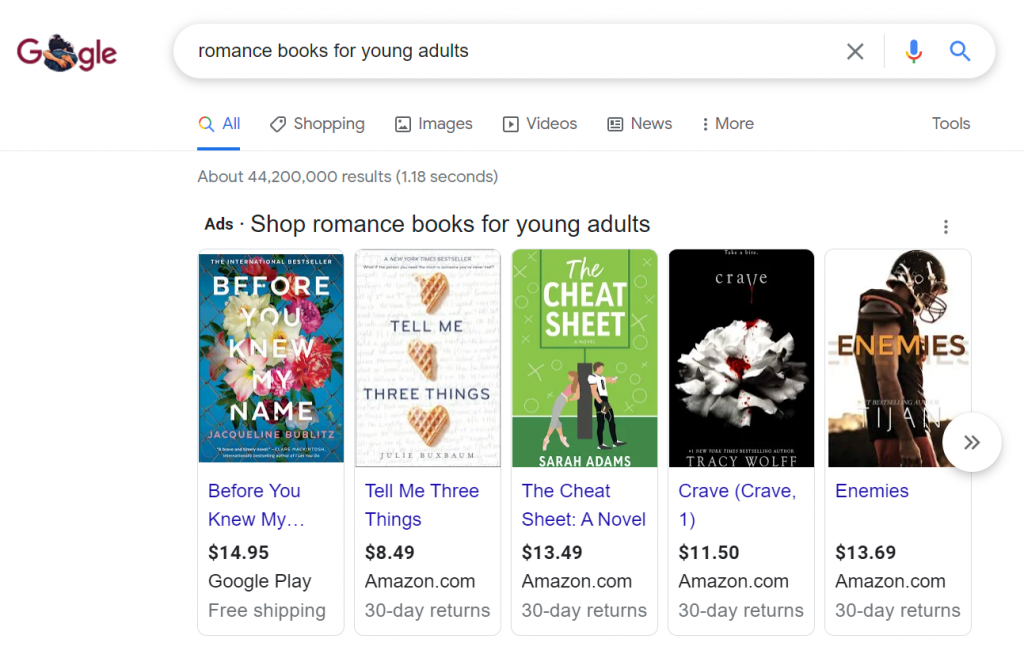
I’m looking for two things in the search results:
- A website entirely about this niche
- For physical products (or ebook novels), Amazon listings are useful
At the top of the search results are listings that include Amazon books.
The second book in that list is on Amazon. Looking at that Amazon page reveals useful info:

Released in 2017 (hardcover looks to be 2016 though), this book has 2,762 reviews on Amazon.
Those reviews apply to all versions of the book sold. Since there are multiple formats and prices, it’s impossible to produce a truly reliable estimate of earnings from this one book.
However, a rough estimate of minimum earnings is possible.
1% – 2% is a common review rate on Amazon. If we assume a 2% review rate, that’s 138,100 sales.
Using the lowest price of $6.99 at a 70% commission (Amazon takes 30% of sales at that price), gives earnings of $4.89 per sale.
138,100 x $4.89 = $675,309
Going from a release date of 2016, that’s a pretty good income average for six years of $112,551.50 per year. Not too bad from a single book.
You can’t write a book for that niche as a brand new author and expect those results though. There are a few things to keep in mind about those results, beyond them being mere estimates:
- This is currently the #1 best seller in this category on amazon, so this is high-end expectations in the niche
- They could’ve changed prices and made less on average per sale
- Some people got the book for free but the author still earn something from each free copy given away
- This might not be their first book. A loyal audience can make later releases much more popular
I could continue research on Amazon to see how much competition exists in the niche (how many other books are in that category, for example). Taking a look at more than one example can give you a better picture of what to expect.
See if you can find a lot of books with 0 reviews – that can be an indication of higher competition. You may be able to handle some higher levels of competition with some of my other strategies since you’ll create an audience to drive your own sales.
Going back to Google, when I scroll through the top 10 results I can’t seem to find a website that is entirely about this niche.
Pages like the ones below are about the niche, but the homepage of those sites targets a broader niche. For this reason, I can’t use these domains to accurately gauge traffic potential for the niche. The information I’ve found on Amazon tells me there will be plenty though. Without Amazon to help, I would need to keep searching for a domain to research.
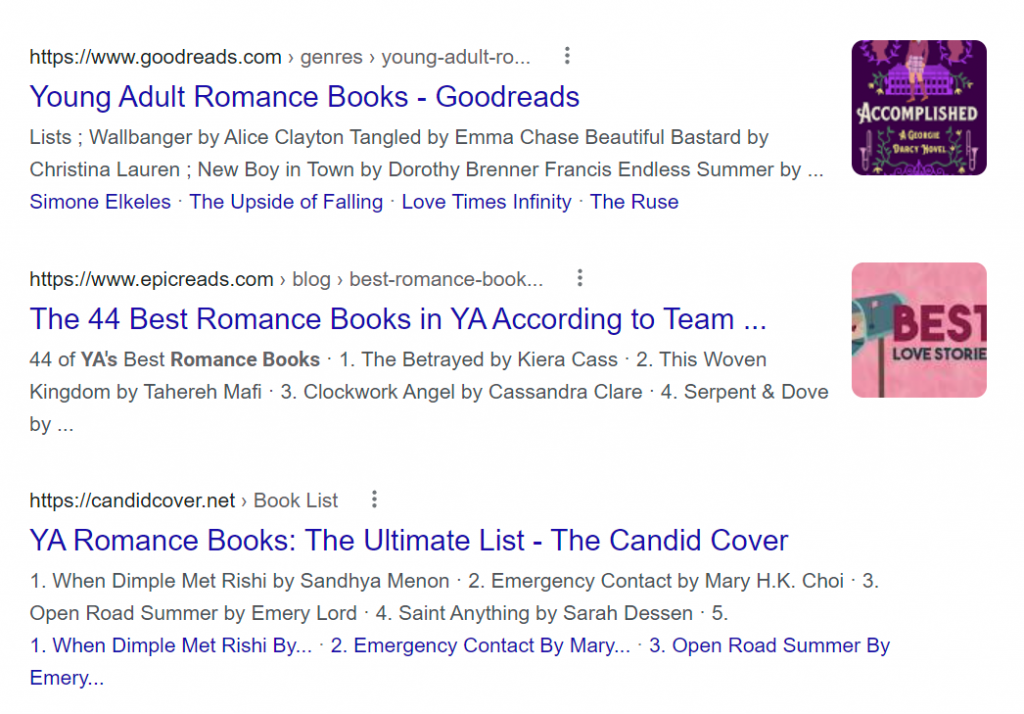
A blog search returns a site that is close to what I want but not perfect. It’s about the niche but this is different from what I would create as an author.
Here’s the blog search:
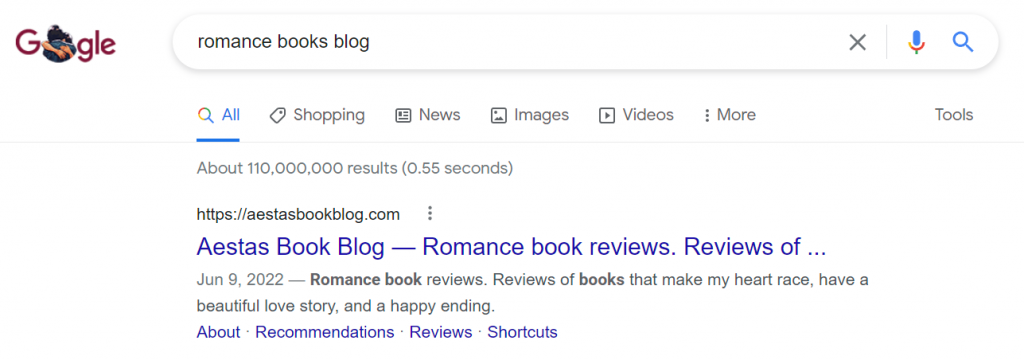
With a domain name to research I can find traffic estimates for it using SimilarWeb: https://similarweb.com
Here are my results on SimilarWeb for that website:
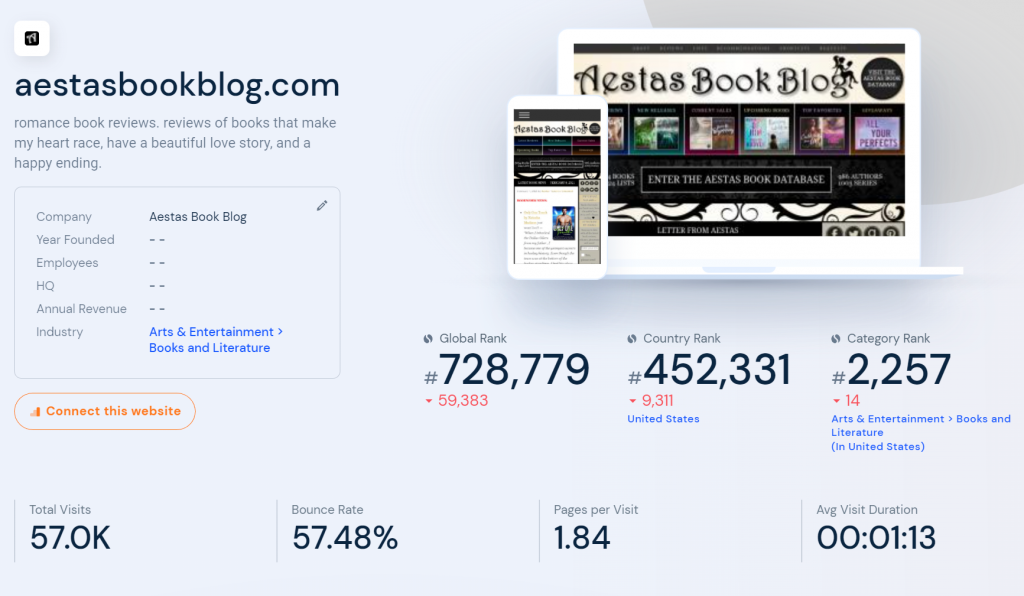
It estimates that this site has 57,000 monthly visits – not amazing but not horrible either. It’s likely enough to make a full-time living though.
The category rank tells me that there are 2,256 other sites about books that are more popular, so this certainly isn’t the upper end of traffic potential.
Again, this isn’t the exact type of site I’d be creating, so I would prefer to do this research with a romance novel author’s website.
For your own research, try to find an established site similar to the one you would build.
Customer & Audience Research
The information that Amazon told me about one of these novels tells me that there a big demand for this kind of book.
For products or services that aren’t on Amazon, researching customer demand can be more difficult. Some websites will have their own review systems, so you can gauge demand that way.
Sometimes you simply have no way to know whether there will be customer demand until you try it yourself. Reddit, social media, and other online forums can be a source of information from others that have tried it.
Customer Demographics
It’s important to know your ideal customer.
What kind of person is most likely to be interested in your business and buy your products?
Try to figure out these things about your potential customers and audience:
- Where do they live?
- Are they male or female?
- What is their age?
- What are their interests?
The sources I’ve already talked about in this guide can also be used for this type of research.
Customer reviews on Amazon products are one potential source of excellent info.
Here’s a few of the reviews from the Amazon product I viewed earlier:
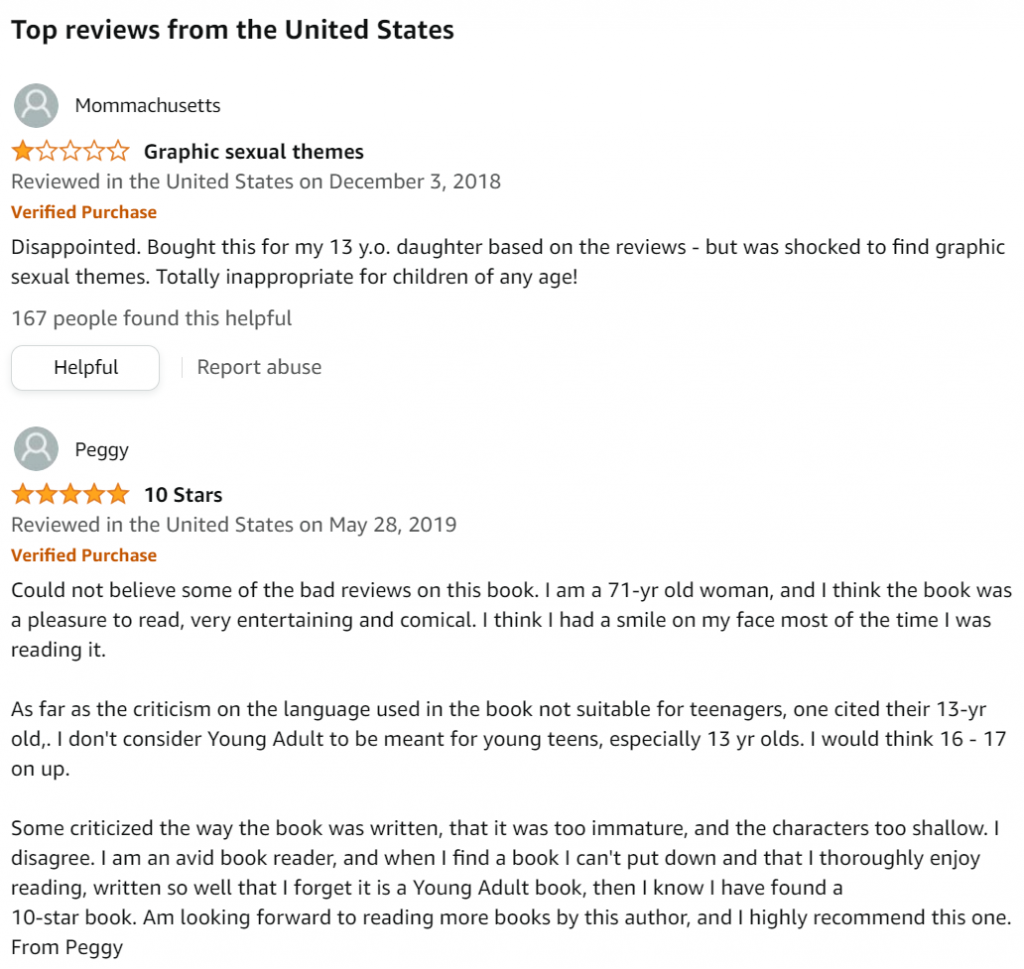
Notice how both of these reviews tell you about the people buying the book. One is a parent that bought it for their 13-year-old kid – they were quite upset that the book had some adult content. Another is a 71-year-old woman that enjoyed the book.
Just this small bit of information tells me a lot about potential customers.
Even though the book is for young adults, the real customer is probably an adult. This seems like a tougher niche since you almost need to please the reader and their parents.
Marketing would be more complicated as a result too. From a marketing standpoint, it would probably be easier to target a specific genre of romance novels, especially ones more geared towards adults.
Website Demographics
SimilarWeb can also tell me useful demographic data about websites.
The search I did earlier for the blog website has more information down the page.
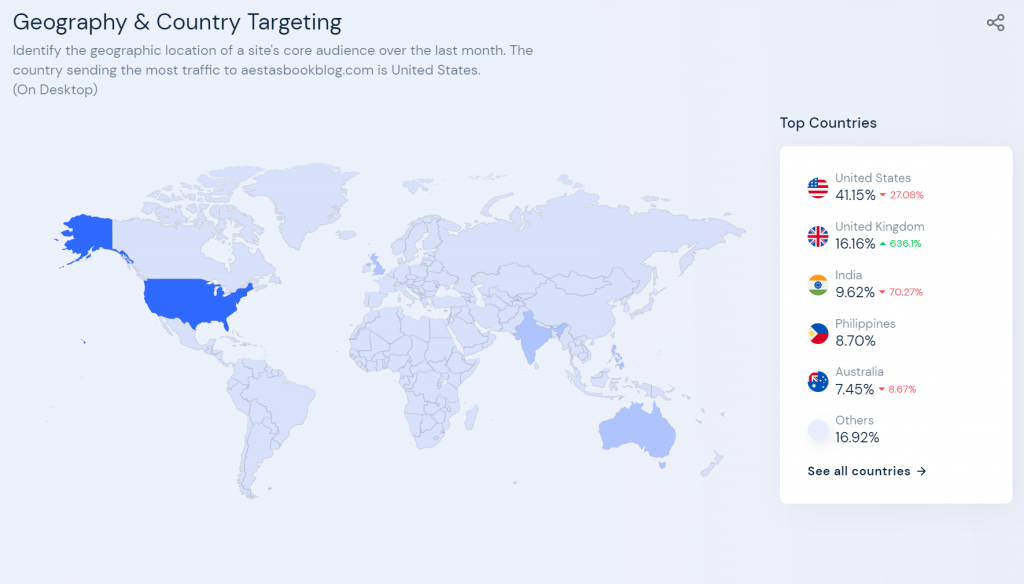
Knowing where my potential customers live is a major help. Search keywords can vary from one country to the next, and paid advertising can be narrowed if you decide to use it.
The United States is the largest source of traffic for this particular website. Even though the United Kingdom delivers less than half as much traffic, they are ranked 2nd.
Notice how traffic for the United Kingdom has spiked 636% and is down in other areas. It could indicate that popularity for this niche is rising in that country
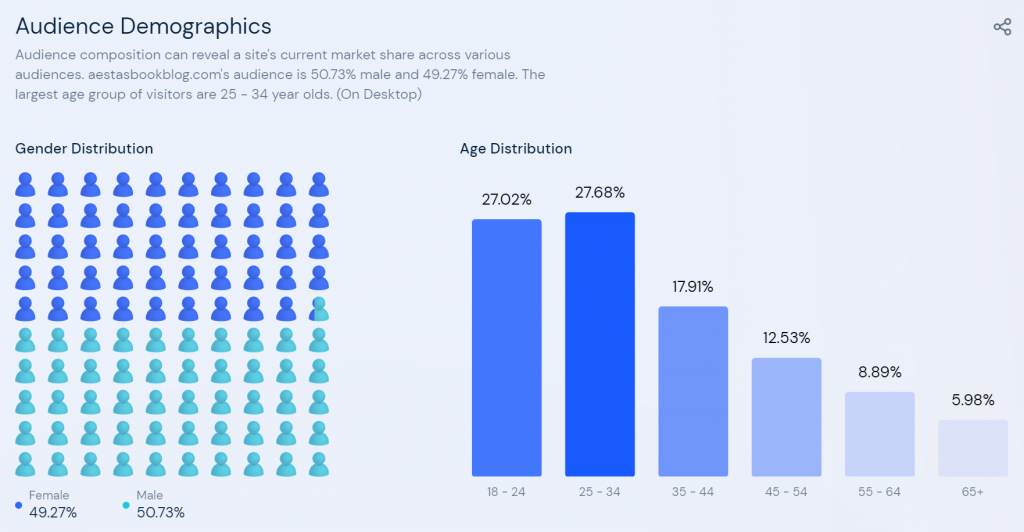
SimilarWeb also gives you useful information about age and sex demographics. It’s obvious from this info that a young adult focused niche would lean slightly female and a bit over half the total audience would be younger than 35 years old.
With sites that are popular enough, they may even provide a list of other interests (this example does not have that data).
Ultimately, you need to know your customer to be able to find them and appeal to them. Too many beginners skip this step and do not have a clear message for their audience or even a clear idea of what their audience wants.
Licensing & Registration
It’s common with your first online business to ignore certain legalities like licensing and registration.
A lot of small businesses do manage to get away avoiding laws, but I truly believe that this is a bad approach that can lead to future damage.
The bad part about licenses for online business is that I can’t tell you whether you even need it.
Where you live will ultimately determine if you need to register your business or apply for any kind of license.
I live in the United States, so I can at least tell you what is common here. However, even these laws vary depending on your state, county and/or city.
PLEASE do research for your specific area. If needed, consult a lawyer and/or your government offices to be sure.
For income tax purposes, I’m able to run an online business as a sole proprietorship. This isn’t a blind choice to make though – taxes, liability, and other factors are different depending on your legal business structure. Professional advice can be very helpful in this area to see what is best for you.
As a sole proprietorship, I only file one tax return but pay taxes at rates for individuals and not for businesses. My money and my business money are the same thing and can exist in the same account together.
By comparison, a corporation or LLC would be a separate business entity. If I used them, I would have to file two tax returns. My money and my business funds would have to stay separate in their own accounts. I would get paid a salary by the business, and I could only use those funds for personal reasons.
With an online business at home, I could run a blog and sell coaching or a training course without any special licensing. I do eCommerce too, so shipping does require licensing where I live. Shipping a product to a customer within my state requires me to collect state sales tax and be registered with the state’s Department of Revenue.
Again, that’s just how it works where I live. You need to figure out how it works where you live.
As an example, California now requires online businesses to register. If you live there but assumed what I’m doing in Florida is okay for you too, that could cause problems.
Business Niche Focus
One of the biggest problems I see for other new businesses on the internet is a lack of clear focus.
The more focused you make your business, the easier it is to deliver that message to your audience and the easier it is to market to them.
For writing and publishing novels, that clear focus could be your book genres.
If my first novel is adult romance and my second is a post-apocalyptic thriller, my audiences for those books won’t match.
Upon releasing my second book, I might run into these problems:
- Fans of my first book might unfollow me if they’re not interested in the new niche.
- Fans of my first book would likely buy another adult romance novel that I release, but they might not buy my second book.
- I’d lose the benefit of building an audience of loyal readers that should result in better sales for my second book if the niches matched. It’s almost like starting over again without an audience.
- Marketing efforts become less clear and more complicated. Do I target an audience of adult romance or post-apocalyptic now? What’s going to be on my social profiles and the home page of my website?
The more focused you can make your business, the better results you’ll see with less effort.
To be clear, you CAN have more than one focus and still succeed, but it will take more work.
Two niches that closely relate or don’t conflict with each other are easier. For example, ghostwriting services could be a secondary focus of my business. As long as I don’t push those things on my book readers, I can still build a section of my website to offer those services.
Monetization
Before you start to build your business, you should know how you plan to make money from it.
Advertising revenue, affiliate marketing, coaching, selling physical products, selling digital products, consulting, services, and more are all possibilities.
I’ve built a popular website before only to realize after two years of hard work that I couldn’t make money from it. You can avoid that pain by planning your strategies for monetization from day 1.
For a romance novel business, income would be primarily from book sales on Amazon – both ebooks and softcover/hardcover editions.
Personally, I would not try to monetize this business with ads, such as Google PPC ads. However, I might consider promoting other relational novels on Amazon as an affiliate. This could also give me a way to get other authors to promote my books with their audience (find them on social media and arrange to trade affiliate promotions on Amazon books).
You are allowed to promote your own books on Amazon with an affiliate link to earn a slightly higher percentage for each sale. I’ll set up a page on a website for each book I release that will promote the book on Amazon with an affiliate link. Driving all sales through Amazon will help with sales rank on that site (best selling books get free exposure on Amazon).
I could also offer ghostwriting services as part of this business. It could be especially useful when I’m getting started since it can offer upfront money for work, while novel sales will spread out earnings over time.
Websites & SEO
Not all online businesses require you to run your own website. Even when they are not necessary, you will usually benefit from one.
Your own site can be a reliable source of leads and sales. It can also be an excellent way to build an email newsletter list, which I’ll talk about in Tip #9 below.
A website is a business asset that you own. You buy a domain name and you have control over the content that you publish.
Too many beginners these days will place their online business 100% into the hands of social media companies. This can be a really bad move.
You can spend years building a successful business on a social network only to wake up one morning and it’s all gone.
Social networks and any third-party company with control over a crucial piece of your business is a recipe for disaster because they can decide to shut you down instantly and without warning.
Most people assume this won’t happen, but it does. A lot in fact. Twitch banned their #1 streamer, so nobody is immune. I watched someone spend three years building a Facebook group to 100k and it got closed without any warning (with nothing nefarious happening there either). They’ve been waiting 7 months just to hear a reason and have a chance to appeal the decision. Facebook really doesn’t care though, and other social networks are likely the same.
Self-publishing novels on Amazon by itself is in jeopardy of a dramatic collapse.
However, if you make your own website and build an audience there, you could continue to sell books somewhere else or on your site if Amazon closed your account for any reason.
Websites are also handy for writing articles to target topics that relate to your niche. By correctly optimizing this content for search engines, you can get free targeted traffic to your site that you can convert into email signups, social followers, and/or sales.
Social Media Marketing
One of the best ways to find new customers and build an audience quickly is on social media.
Here are my quick-tips for tackling social marketing for a new online business:
- Research social networks to figure out where your audience likes to hang out and socialize. Different niches will perform better on different networks.
- Find relational accounts to follow to get started. Sometimes the best picks are your own competitors since their audience could be your audience too.
- Publish some kind of content each day that relates to your niche. This will help keep your audience active, build your name recognition, and also help attract new followers.
Big followings on social media rarely happen overnight, so be patient and consistent with your message. As long as you’re growing larger over time, you’re on track for success. The bigger you get, the faster you’ll grow – for this reason, starting can be tough.
Online Business Networking
When you’re new to online business, you can sometimes feel like you’re at war with your direct competitors.
I’ve found the most success by embracing my direct competition though instead of actually trying to compete against them.
Just like you, your competition wants to grow and improve their business. Use this to your advantage to help yourself grow too.
For novel sales, I would connect with other authors that sell the exact same type of book as me. Cross-promoting each other could be beneficial to both.
I spent years trying to go 100% solo with an online business. It can work, but it’s really tough.
Once I learned to team up with my competition, it changed the game completely.
With this knowledge, I highly recommend that you spend time every week trying to network with other business owners in your niche. Get to know them. Become friends. Help them when they are in need.
When possible, meet them in person to solidify that bond even more. When I started going to marketing conferences and meeting online business owners in person that I had worked with for years, their support drastically increased after I met them in real life.
Email Newsletters
I’m a firm believer that any online business can benefit from email marketing and building a newsletter list. Having a way to instantly contact your audience has been one of the most reliable ways I’ve made money from every successful online business I’ve built in the last 15 years. Without it, I would struggle to make even 10% of the earnings, so I highly recommend it for others.
I’ve already created an in-depth guide that teaches my strategies to build an email newsletter. This is a full-size lesson in itself, so you may need to reserve this training for tomorrow.
Learn how to build a newsletter list here: Email Marketing Guide
Conclusion & Next Steps
Plan your business and niche. Get a clear idea of what you will sell and who you will sell it to. Figure out where you will find those people and how you will attract them to follow you and buy your products / services.
With a clear plan in mind, you can set up social media accounts, start building a website, and start creating your first product to sell. The website and social accounts are the most important to start early since they’ll take the longest to grow.
With my example that I’ve used throughout this guide, I could build those things and grow my audience while I write my first book. Once it’s ready to publish, I could have an audience eager and ready to buy it.
